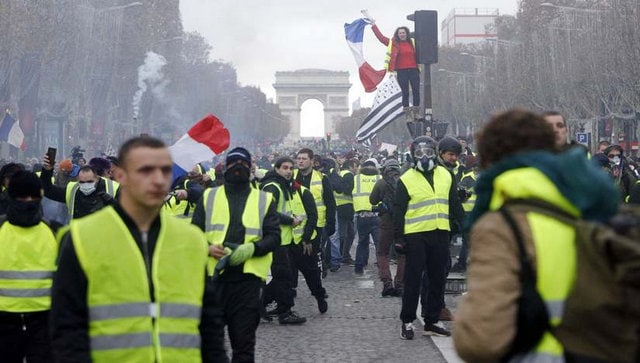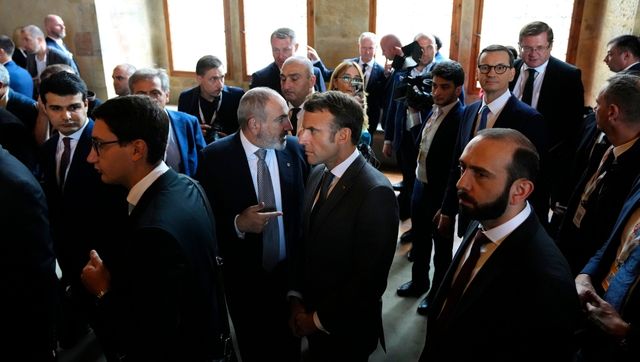The biggest test of President Emmanuel Macron’s second term has arrived with protests snowballing across France and demonstrators and police clashing in the streets. In Paris, several thousands were out in full force amid calls for wage hikes to combat inflation, while protesters clad in black shattered shop windows and battled the police. The interior ministry said eleven were arrested in Paris and 107,000 people nationwide followed the protest call from left-wing parties and some unions, including 13,000 in the capital. The hard-line CGT trade union said 70,000 people took part in the march in Paris alone. This, a day after Sunday saw tens of thousands marching with some wearing the yellow fluorescent vests, the symbol of the often violent anti-government protests in 2018. Which raises the question – Is France on the verge of yet another yellow vest movement? Let’s take a closer look: What’s been happening in France? It all began with a refinery strike that began at the end of September, an action that caused fuel shortages across France. “It’s time to go back to work,” French prime minister Elisabeth Borne said Tuesday about people on strike in the French refineries of oil giant TotalEnergies.
However, the opposite seems to be happening.
Rail and other transportation workers in trucking and bus companies, some high school teachers and public hospital employees have heeded a call by an oil workers’ union to push for salary increases and protest government intervention in the refinery strikes. This comes in the backdrop of similar protests erupting around Europe in recent months over the impact of inflation, causing disruptions like canceled flights and trains. Thousands protested in Prague twice last month partly about high energy prices, airline workers have gone on strike like Germany and Sweden to demand higher pay. In the UK, everyone from nurses to rail employees have walked off the job to demand their wages keep pace with inflation. Is it comparable to the yellow vest movement? Not just yet. Tuesday’s protests, which have been promoted by Opposition politicians for weeks, were tiny when compared to those of the 2018 yellow vest movement or the opposition to a rents reform during President Emmanuel Macron’s first term as president. However, the shadow of the 2018 protests, which shook up Macron’s business friendly government, looms large. [caption id=“attachment_11481331” align=“alignnone” width=“640”] File image of yellow-vested demonstrators marching on the famed Champs-Elysees avenue in Paris. AP[/caption] Those protests were sparked a tax hike on fuel, but quickly changed into a larger grievance against economic equality and a rejection of Macron’s governing style, as per Bloomberg. “I wonder whether we are not going through the first tremors of a new yellow vest movement,” a senior Macron supporter wondered while speaking to Le Parisien. The Telegraph quoted Xavier Bertrand, head of the Hauts-de-France region, the worst-hit by petrol shortages, as saying “Where are their sensors? It’s just like the gilets jaunes [yellow vests] they didn’t see it coming.” Macron’s plan to reform pensions, which saw public services and transport disrupted, were put off by the COVID-19 pandemic as per Bloomberg. A few months later, massive demonstrations against his plan to reform pensions disrupted transport and public services, until it was suspended during the Covid pandemic.
File image of yellow-vested demonstrators marching on the famed Champs-Elysees avenue in Paris. AP[/caption] Those protests were sparked a tax hike on fuel, but quickly changed into a larger grievance against economic equality and a rejection of Macron’s governing style, as per Bloomberg. “I wonder whether we are not going through the first tremors of a new yellow vest movement,” a senior Macron supporter wondered while speaking to Le Parisien. The Telegraph quoted Xavier Bertrand, head of the Hauts-de-France region, the worst-hit by petrol shortages, as saying “Where are their sensors? It’s just like the gilets jaunes [yellow vests] they didn’t see it coming.” Macron’s plan to reform pensions, which saw public services and transport disrupted, were put off by the COVID-19 pandemic as per Bloomberg. A few months later, massive demonstrations against his plan to reform pensions disrupted transport and public services, until it was suspended during the Covid pandemic.
The trouble is Macron now intends to go on with those unpopular reforms.
As per The New York Times, absent an absolute majority in the National Assembly, Macron’s government will be using special constitutional powers to push it through. The newspaper quoted Olivier Véran, the government’s spokesman, said it would “probably” do so on Wednesday. [caption id=“attachment_11403281” align=“alignnone” width=“640”] France’s president Emmanuel Macron, center right, speaks with Armenia’s Prime Minister Nikol Pasjinian after a group photo during a meeting of the European Political Community at Prague Castle in Prague, Czech Republic. AP[/caption] Étienne Ollion, a sociologist at the Polytechnique engineering school, described the move as “a bit of an authoritarian measure” to The New York Times. “It could have an effect on the mobilisations,” Ollion said, saying some might see such an action as “an attempt to avoid confronting the reality of the situation.” Others fear an even worse repeat – of the 1968 student revolt that saw then president Charles de Gaulle briefly flee the nation. “France is a veritable powder keg, that’s nothing new,” Guy Groux, social movement specialist at Cevipov, the centre for political research at Sciences Po, told The Telegraph. “There is a sort of magic to social anger. It’s hard to say how all the ingredients come together. During the first student demos in 1968, some commentators said: It’s just a few rag parades. We saw how that ended,” he added. Train traffic cut by half, power operators warn of ‘heavy consequences’ On Tuesday, train traffic was cut by about half as several unions called a nationwide strike. “The question of wages is the French people’s number one priority,” the head of the CGT union, Philippe Martinez said ahead of the march. “It’s more than urgent,” he said. “At some point it’s no longer manageable,” Laetitia Berthault, one of the protesters said, pointing to a pay rise of just 10 euros per month from the furniture chain she works for. “I’m a single mother, two children. We tighten our belts … we have no choice. But it’s not easy.” As industrial action at oil major TotalEnergies (TTEF.PA) keeps weighing on petrol supplies for a fourth week with no clear end in sight, the government faces the risk wider walkouts could take down other parts of the infrastructure. France’s national grid operator RTE warned on Tuesday that prolonged strikes delaying the restart of some reactors at nuclear power group EDF (EDF.PA) could have “heavy consequences” for the country’s electricity supplies over the coming winter. Trade union leaders were hoping workers would be energised by the government’s decision to force some of them to go back to work at petrol depots to try and get fuel flowing again, a decision some say put in jeopardy the right to strike. But a survey by Elabe pollsters for BFM TV showed only 39 per cent of the public backed Tuesday’s call for a nationwide strike, while 49 per cent opposed it, and growing numbers opposed the strike by oil refinery workers. On the transport front, Eurostar said it was cancelling some trains between London and Paris due to the strike. French public railway operator SNCF said that traffic on regional connections was down 50 per cent but national lines had no disruptions. As tensions rise in the euro zone’s second-biggest economy, strikes have spilled over into other parts of the energy sector, including nuclear giant EDF (EDF.PA), where maintenance work crucial for Europe’s power supply will be delayed. With inputs from agencies Read all the
Latest News
,
Trending News
,
Cricket News
,
Bollywood News
, India News
and
Entertainment News
here. Follow us on
Facebook
,
Twitter
and
Instagram
.
France’s president Emmanuel Macron, center right, speaks with Armenia’s Prime Minister Nikol Pasjinian after a group photo during a meeting of the European Political Community at Prague Castle in Prague, Czech Republic. AP[/caption] Étienne Ollion, a sociologist at the Polytechnique engineering school, described the move as “a bit of an authoritarian measure” to The New York Times. “It could have an effect on the mobilisations,” Ollion said, saying some might see such an action as “an attempt to avoid confronting the reality of the situation.” Others fear an even worse repeat – of the 1968 student revolt that saw then president Charles de Gaulle briefly flee the nation. “France is a veritable powder keg, that’s nothing new,” Guy Groux, social movement specialist at Cevipov, the centre for political research at Sciences Po, told The Telegraph. “There is a sort of magic to social anger. It’s hard to say how all the ingredients come together. During the first student demos in 1968, some commentators said: It’s just a few rag parades. We saw how that ended,” he added. Train traffic cut by half, power operators warn of ‘heavy consequences’ On Tuesday, train traffic was cut by about half as several unions called a nationwide strike. “The question of wages is the French people’s number one priority,” the head of the CGT union, Philippe Martinez said ahead of the march. “It’s more than urgent,” he said. “At some point it’s no longer manageable,” Laetitia Berthault, one of the protesters said, pointing to a pay rise of just 10 euros per month from the furniture chain she works for. “I’m a single mother, two children. We tighten our belts … we have no choice. But it’s not easy.” As industrial action at oil major TotalEnergies (TTEF.PA) keeps weighing on petrol supplies for a fourth week with no clear end in sight, the government faces the risk wider walkouts could take down other parts of the infrastructure. France’s national grid operator RTE warned on Tuesday that prolonged strikes delaying the restart of some reactors at nuclear power group EDF (EDF.PA) could have “heavy consequences” for the country’s electricity supplies over the coming winter. Trade union leaders were hoping workers would be energised by the government’s decision to force some of them to go back to work at petrol depots to try and get fuel flowing again, a decision some say put in jeopardy the right to strike. But a survey by Elabe pollsters for BFM TV showed only 39 per cent of the public backed Tuesday’s call for a nationwide strike, while 49 per cent opposed it, and growing numbers opposed the strike by oil refinery workers. On the transport front, Eurostar said it was cancelling some trains between London and Paris due to the strike. French public railway operator SNCF said that traffic on regional connections was down 50 per cent but national lines had no disruptions. As tensions rise in the euro zone’s second-biggest economy, strikes have spilled over into other parts of the energy sector, including nuclear giant EDF (EDF.PA), where maintenance work crucial for Europe’s power supply will be delayed. With inputs from agencies Read all the
Latest News
,
Trending News
,
Cricket News
,
Bollywood News
, India News
and
Entertainment News
here. Follow us on
Facebook
,
Twitter
and
Instagram
.
)